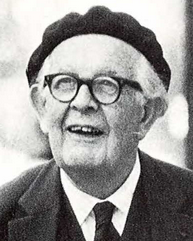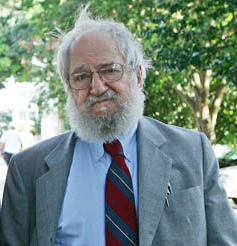Educational psychology is the branch of psychology concerned with the scientific study of human learning. The study of learning processes, from both cognitive and behavioral perspectives, allows researchers to understand individual differences in intelligence, cognitive development, affect, motivation, self-regulation, and self-concept, as well as their role in learning. The field of educational psychology relies heavily on quantitative methods, including testing and measurement, to enhance educational activities related to instructional design, classroom management, and assessment, which serve to facilitate learning processes in various educational settings across the lifespan.

Learning theory describes how students receive, process, and retain knowledge during learning. Cognitive, emotional, and environmental influences, as well as prior experience, all play a part in how understanding, or a worldview, is acquired or changed and knowledge and skills retained.

Jean William Fritz Piaget was a Swiss psychologist known for his work on child development. Piaget's theory of cognitive development and epistemological view are together called genetic epistemology.
Social constructivism is a sociological theory of knowledge according to which human development is socially situated, and knowledge is constructed through interaction with others. Like social constructionism, social constructivism states that people work together to actively construct artifacts. But while social constructivism focuses on cognition, social constructionism focuses on the making of social reality.
Instructional scaffolding is the support given to a student by an instructor throughout the learning process. This support is specifically tailored to each student; this instructional approach allows students to experience student-centered learning, which tends to facilitate more efficient learning than teacher-centered learning. This learning process promotes a deeper level of learning than many other common teaching strategies.
In psychology, cognitivism is a theoretical framework for understanding the mind that gained credence in the 1950s. The movement was a response to behaviorism, which cognitivists said neglected to explain cognition. Cognitive psychology derived its name from the Latin cognoscere, referring to knowing and information, thus cognitive psychology is an information-processing psychology derived in part from earlier traditions of the investigation of thought and problem solving.

Constructivism is a view in the philosophy of science that maintains that scientific knowledge is constructed by the scientific community, which seeks to measure and construct models of the natural world. According to constructivists, natural science consists of mental constructs that aim to explain sensory experiences and measurements, and that there is no single valid methodology in science but rather a diversity of useful methods. They also hold that the world is independent of human minds, but knowledge of the world is always a human and social construction. Constructivism opposes the philosophy of objectivism, embracing the belief that human beings can come to know the truth about the natural world not mediated by scientific approximations with different degrees of validity and accuracy.

Student-centered learning, also known as learner-centered education, broadly encompasses methods of teaching that shift the focus of instruction from the teacher to the student. In original usage, student-centered learning aims to develop learner autonomy and independence by putting responsibility for the learning path in the hands of students by imparting to them skills, and the basis on how to learn a specific subject and schemata required to measure up to the specific performance requirement. Student-centered instruction focuses on skills and practices that enable lifelong learning and independent problem-solving. Student-centered learning theory and practice are based on the constructivist learning theory that emphasizes the learner's critical role in constructing meaning from new information and prior experience.

Early childhood education (ECE), also known as nursery education, is a branch of education theory that relates to the teaching of children from birth up to the age of eight. Traditionally, this is up to the equivalent of third grade. ECE is described as an important period in child development.
The psychology of learning refers to theories and research on how individuals learn. There are many theories of learning. Some take on a more behaviorist approach which focuses on inputs and reinforcements. Other approaches, such as neuroscience and social cognition, focus more on how the brain's organization and structure influence learning. Some psychological approaches, such as social constructivism, focus more on one's interaction with the environment and with others. Other theories, such as those related to motivation, like the growth mindset, focus more on individuals' perceptions of ability.
Radical constructivism is an approach to epistemology that situates knowledge in terms of knowers' experience. It looks to break with the conception of knowledge as a correspondence between a knower's understanding of their experience and the world beyond that experience. Adopting a skeptical position towards correspondence as in principle impossible to verify because one cannot access the world beyond one's experience in order to test the relation, radical constructivists look to redefine epistemology in terms of the viability of knowledge within knowers' experience. This break from the traditional framing of epistemology differentiates it from "trivial" forms of constructivism that emphasise the role of the knower in constructing knowledge while maintaining the traditional perspective of knowledge in terms of correspondence. Radical constructivism has been described as a "post-epistemological" position.
Cognitive apprenticeship is a theory that emphasizes the importance of the process in which a master of a skill teaches that skill to an apprentice.

Constructionist learning is the creation by learners of mental models to understand the world around them. Constructionism advocates student-centered, discovery learning where students use what they already know to acquire more knowledge. Students learn through participation in project-based learning where they make connections between different ideas and areas of knowledge facilitated by the teacher through coaching rather than using lectures or step-by-step guidance. Further, constructionism holds that learning can happen most effectively when people are active in making tangible objects in the real world. In this sense, constructionism is connected with experiential learning and builds on Jean Piaget's epistemological theory of constructivism.
Constructivist teaching is based on constructivism. Constructivist teaching is based on the belief that learning occurs as learners are actively involved in a process of meaning and knowledge construction as opposed to passively receiving information.

The zone of proximal development (ZPD) is a concept in educational psychology. It represents the space between what a learner is capable of doing unsupported and what the learner cannot do even with support. It is the range where the learner is able to perform, but only with support from a teacher or a peer with more knowledge or expertise. The concept was introduced, but not fully developed, by psychologist Lev Vygotsky (1896–1934) during the last three years of his life. Vygotsky argued that a child gets involved in a dialogue with the "more knowledgeable other", such as a peer or an adult, and gradually, through social interaction and sense-making, develops the ability to solve problems independently and do certain tasks without help. Following Vygotsky, some educators believe that the role of education is to give children experiences that are within their zones of proximal development, thereby encouraging and advancing their individual learning skills and strategies.
Inquiry-based learning is a form of active learning that starts by posing questions, problems or scenarios. It contrasts with traditional education, which generally relies on the teacher presenting facts and their knowledge about the subject. Inquiry-based learning is often assisted by a facilitator rather than a lecturer. Inquirers will identify and research issues and questions to develop knowledge or solutions. Inquiry-based learning includes problem-based learning, and is generally used in small-scale investigations and projects, as well as research. The inquiry-based instruction is principally very closely related to the development and practice of thinking and problem-solving skills.
In psychology, constructivism refers to many schools of thought that, though extraordinarily different in their techniques, are all connected by a common critique of previous standard approaches, and by shared assumptions about the active constructive nature of human knowledge. In particular, the critique is aimed at the "associationist" postulate of empiricism, "by which the mind is conceived as a passive system that gathers its contents from its environment and, through the act of knowing, produces a copy of the order of reality".
Genetic epistemology or 'developmental theory of knowledge' is a study of the origins (genesis) of knowledge (epistemology) established by Swiss psychologist Jean Piaget. This theory opposes traditional epistemology and unites constructivism and structuralism. Piaget took epistemology as the starting point and adopted the method of genetics, arguing that all knowledge of the child is generated through interaction with the environment.
Cognitive Emotional Pedagogy (CEP) is a method of teaching and learning based on cognitive psychology and constructivist learning theory which claims that construction and retention of new concepts and skills is most effective if the learning content is associated with creativity and emotionally distinct experiences. The theoretical framework was created by Joni Mäkivirta.
Constructivism has been considered as a dominant paradigm, or research programme, in the field of science education since the 1980s. The term constructivism is widely used in many fields, and not always with quite the same intention. This entry offers an account of how constructivism is most commonly understood in science education.







